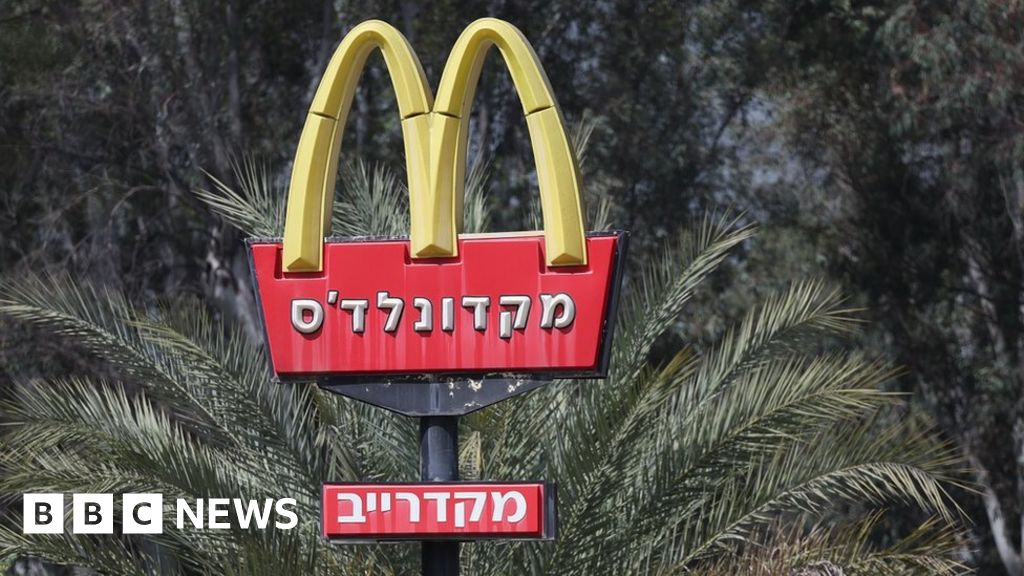
- Written by Chris Newlands
- Business reporter
McDonald's' surprise decision to take ownership of its branches in Israel has put franchise company Alonial and its CEO Omri Badan in the spotlight.
McDonald's will buy back all of its Israeli restaurants after global sales fell due to a boycott of the brand over its apparent support for Israel in its war against Hamas in Gaza.
The fast food giant uses a franchise system which means individual operators are licensed to operate outlets and employ staff. But the wider company came under fire after Mr Badan offered free meals to Israeli forces at the start of the war between Israel and Gaza on October 7.
The boycott erupted after Muslim-majority countries such as Kuwait, Malaysia and Pakistan issued statements distancing themselves from the company over what they saw as support for Israel.
But Badan is not new to the controversy surrounding the Israeli-Palestinian conflict. For 30 years, the businessman has been running McDonald's restaurants in Israel, and has been at the center of a number of disputes.
Image source, Getty Images
In 2013, the Israeli businessman angered the Israeli settlement movement when he rejected invitations to open a branch of the fast food chain in the Ariel settlement in the occupied West Bank. Badan's company, Alonial, was asked to set up a restaurant in a shopping mall, but it refused, saying the company had a policy of staying outside the occupied territories.
The company said at the time that the decision was not made in coordination with McDonald's headquarters in the United States.
Israel has built about 160 settlements housing about 700,000 Jews since it occupied the West Bank and East Jerusalem, the lands that the Palestinians want as part of their future state, in the 1967 Middle East war.
The vast majority of the international community considers the settlements illegal under international law, although Israel disputes this.
Mr. Badan is one of the founders of the Peace Now group, which opposes all settlements and considers them obstacles to peace. Peace Now says he is no longer a member of the group, which was founded in 1978.
The leader of the Yesha Council, the settlers' umbrella organization, said at the time that McDonald's had transformed from a for-profit company into one with an “anti-Israel political agenda.”
Alonial's decision resurfaced in 2019 when McDonald's won a bid to run a restaurant and hot dog stand at Israel's Ben Gurion Airport.
In response, West Bank settlement leaders sent several letters of protest calling on the Finance and Transportation Ministries, as well as the Israel Airports Authority, to block the move. Protests were also held outside the fast food chain's restaurants in Tel Aviv.
On Thursday, it was suddenly announced that Alonial would sell the sprawling franchise back to the US food giant.
McDonald's did not disclose the terms of the deal, although a reputation management expert, who has worked on behalf of a number of major companies but did not want to speak on the record, said those angry about the decision to provide free meals to Israelis and troops may be “furious that this agreement… “It could make Mr Badan a very rich man.”
However, they may be happy with the impact the boycott has had.
Badan's departure comes after McDonald's said the conflict between Israel and Gaza “significantly impacted” performance in some foreign markets in the final quarter of 2023.
For the unit that includes the Middle East, China and India, sales growth was 0.7% in the fourth quarter of 2023 – well below market expectations.
At the beginning of the year, McDonald's CEO Chris Kempczinski blamed the backlash on “misinformation.”
The company also called the boycott “disheartening and baseless,” and it relies on thousands of independent companies to own and operate most of its more than 40,000 stores around the world. About 5% of them are located in the Middle East.
“I get it,” the brand management expert said. “They're buying back franchises to regain control but I'm not sure they've done that.”
They also wondered where the company might draw the line: “Does this mean… [McDonald’s] Will you now have to act and offer deals in other areas that have caused reputational damage?”
McDonald's said on Thursday that it “remains committed to the Israeli market and to ensuring a positive experience for employees and customers in the market in the future.”
She also thanked Alonial for building the brand in Israel, while Mr. Badan said: “We are encouraged by what the future holds.”
BBC News has not received any further comment from Badan or Alonial through McDonald's.




More Stories
JPMorgan expects the Fed to cut its benchmark interest rate by 100 basis points this year
Shares of AI chip giant Nvidia fall despite record $30 billion in sales
Nasdaq falls as investors await Nvidia earnings